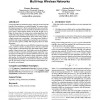Free Online Productivity Tools
i2Speak
i2Symbol
i2OCR
iTex2Img
iWeb2Print
iWeb2Shot
i2Type
iPdf2Split
iPdf2Merge
i2Bopomofo
i2Arabic
i2Style
i2Image
i2PDF
iLatex2Rtf
Sci2ools
MOBIHOC
2002
ACM
2002
ACM
Minimum energy paths for reliable communication in multi-hop wireless networks
Current algorithms for minimum-energy routing in wireless networks typically select minimum-cost multi-hop paths. In scenarios where the transmission power is fixed, each link has the same cost and the minimum-hop path is selected. In situations where the transmission power can be varied with the distance of the link, the link cost is higher for longer hops; the energy-aware routing algorithms select a path with a large number of small-distance hops. In this paper, we argue that such a formulation based solely on the energy spent in a single transmission is misleading -- the proper metric should include the total energy (including that expended for any retransmissions necessary) spent in reliably delivering the packet to its final destination. We first studyhow link error rates affect this retransmission-aware metric, and how it leads to an efficient choice between a path with a large number of short-distance hops and another with a smaller number of large-distance hops. Such studies ...
| Added | 24 Dec 2009 |
| Updated | 24 Dec 2009 |
| Type | Conference |
| Year | 2002 |
| Where | MOBIHOC |
| Authors | Suman Banerjee, Archan Misra |
Comments (0)

